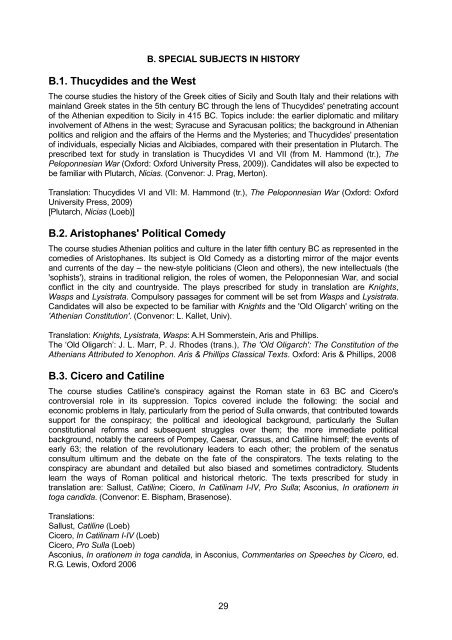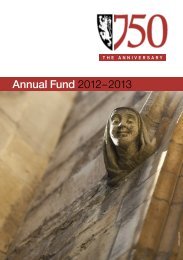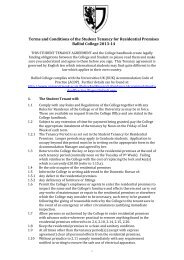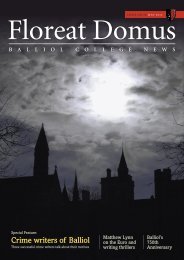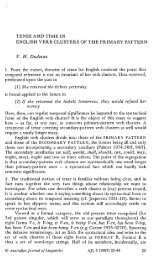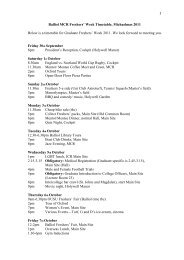CAAH Mods 2011 - Balliol College - University of Oxford
CAAH Mods 2011 - Balliol College - University of Oxford
CAAH Mods 2011 - Balliol College - University of Oxford
Create successful ePaper yourself
Turn your PDF publications into a flip-book with our unique Google optimized e-Paper software.
B.1. Thucydides and the West<br />
B. SPECIAL SUBJECTS IN HISTORY<br />
The course studies the history <strong>of</strong> the Greek cities <strong>of</strong> Sicily and South Italy and their relations with<br />
mainland Greek states in the 5th century BC through the lens <strong>of</strong> Thucydides' penetrating account<br />
<strong>of</strong> the Athenian expedition to Sicily in 415 BC. Topics include: the earlier diplomatic and military<br />
involvement <strong>of</strong> Athens in the west; Syracuse and Syracusan politics; the background in Athenian<br />
politics and religion and the affairs <strong>of</strong> the Herms and the Mysteries; and Thucydides' presentation<br />
<strong>of</strong> individuals, especially Nicias and Alcibiades, compared with their presentation in Plutarch. The<br />
prescribed text for study in translation is Thucydides VI and VII (from M. Hammond (tr.), The<br />
Peloponnesian War (<strong>Oxford</strong>: <strong>Oxford</strong> <strong>University</strong> Press, 2009)). Candidates will also be expected to<br />
be familiar with Plutarch, Nicias. (Convenor: J. Prag, Merton).<br />
Translation: Thucydides VI and VII: M. Hammond (tr.), The Peloponnesian War (<strong>Oxford</strong>: <strong>Oxford</strong><br />
<strong>University</strong> Press, 2009)<br />
[Plutarch, Nicias (Loeb)]<br />
B.2. Aristophanes' Political Comedy<br />
The course studies Athenian politics and culture in the later fifth century BC as represented in the<br />
comedies <strong>of</strong> Aristophanes. Its subject is Old Comedy as a distorting mirror <strong>of</strong> the major events<br />
and currents <strong>of</strong> the day – the new-style politicians (Cleon and others), the new intellectuals (the<br />
'sophists'), strains in traditional religion, the roles <strong>of</strong> women, the Peloponnesian War, and social<br />
conflict in the city and countryside. The plays prescribed for study in translation are Knights,<br />
Wasps and Lysistrata. Compulsory passages for comment will be set from Wasps and Lysistrata.<br />
Candidates will also be expected to be familiar with Knights and the 'Old Oligarch' writing on the<br />
'Athenian Constitution'. (Convenor: L. Kallet, Univ).<br />
Translation: Knights, Lysistrata, Wasps: A.H Sommerstein, Aris and Phillips.<br />
The ‘Old Oligarch’: J. L. Marr, P. J. Rhodes (trans.), The 'Old Oligarch': The Constitution <strong>of</strong> the<br />
Athenians Attributed to Xenophon. Aris & Phillips Classical Texts. <strong>Oxford</strong>: Aris & Phillips, 2008<br />
B.3. Cicero and Catiline<br />
The course studies Catiline's conspiracy against the Roman state in 63 BC and Cicero's<br />
controversial role in its suppression. Topics covered include the following: the social and<br />
economic problems in Italy, particularly from the period <strong>of</strong> Sulla onwards, that contributed towards<br />
support for the conspiracy; the political and ideological background, particularly the Sullan<br />
constitutional reforms and subsequent struggles over them; the more immediate political<br />
background, notably the careers <strong>of</strong> Pompey, Caesar, Crassus, and Catiline himself; the events <strong>of</strong><br />
early 63; the relation <strong>of</strong> the revolutionary leaders to each other; the problem <strong>of</strong> the senatus<br />
consultum ultimum and the debate on the fate <strong>of</strong> the conspirators. The texts relating to the<br />
conspiracy are abundant and detailed but also biased and sometimes contradictory. Students<br />
learn the ways <strong>of</strong> Roman political and historical rhetoric. The texts prescribed for study in<br />
translation are: Sallust, Catiline; Cicero, In Catilinam I-IV, Pro Sulla; Asconius, In orationem in<br />
toga candida. (Convenor: E. Bispham, Brasenose).<br />
Translations:<br />
Sallust, Catiline (Loeb)<br />
Cicero, In Catilinam I-IV (Loeb)<br />
Cicero, Pro Sulla (Loeb)<br />
Asconius, In orationem in toga candida, in Asconius, Commentaries on Speeches by Cicero, ed.<br />
R.G. Lewis, <strong>Oxford</strong> 2006<br />
29


